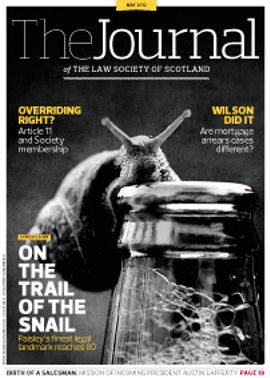Book reviews
Domestic Abuse and Scots Law
General editor: Helen Hughes
PUBLISHER: W GREEN
ISBN: 9780414017887
PRICE: £66.30
This is a book which is long overdue in relation to domestic abuse. The book contains relevant and up-to-date information in relation to various aspects of domestic abuse in Scotland. The general editor has pulled together a variety of chapters which are well thought-out and add to the overall package.
From the initial introduction this book covers domestic abuse in all its forms, with a helpful chapter on the psychological impact on those who experience domestic abuse and an even more helpful chapter on children in domestic abuse situations, both by a clinical psychologist.
The chapter written by the general editor covering civil court orders and other protective measures is very informative and bang up to date. From a general practitioner’s point of view there is a great deal of mystery about the various types of Interdicts which can be obtained and when exactly each of these should be sought. The only criticism I have in relation to the book is that whilst there is a great deal of information about the various Interdicts available, there is no guide to which Interdicts are best for each particular situation.
This however should not detract from a practitioner buying the book for their law library.
Children’s hearings are covered in a very helpful chapter and the extent of coverage available to the media and the news is also explained in detail.
Appendices cover case studies relating to criminal injuries, following on from an informative chapter on various actions that can be taken if indeed you are a victim of domestic violence and require to resort to criminal injuries compensation.
There is a very helpful appendix II in relation to a non-clinical attachment checklist to be used to assess whether a child is likely to be evidencing attachment issues.
Up to date legislation is also included with the usual bank of styles.
This is a book which I would suggest covers most of the angles, and because of all the information contained therein should be bought as a specialist book for the general practitioner.
Public Inquiries
Jason Beer QC (with James Dingemanns QC, Richard Lissack QC)
PUBLISHER: OXFORD UNIVERSITY PRESS
ISBN: 9780199287772
PRICE: £125
This is the first book to tackle the subject of public inquiries, although there have been numerous learned articles on particular aspects of these proceedings over the years. Public inquiries have been with us in one form or another for a long time, but they still happen with relative infrequency, so it is perhaps not surprising (here I respectfully disagree with Lord Brown of Eaton-under-Heywood, who wrote the foreword to the book) that no one has until now undertaken the considerable effort of putting together a comprehensive textbook on the subject. The market for this book will inevitably be a small and specialised one, which makes the obvious care and attention that has gone into the book all the more commendable.
The early section on the history of public inquiries is interesting (even entertaining), particularly the accounts of some of the more colourful parliamentary select committees. The remainder of the book follows to some extent the same chronological order as an inquiry, from the point at which it is established and the appointment of personnel, through evidence and procedure to the publication of the report. Where there is a divergence between Scottish and English practice, both are explained, and the appendices include copies of the Scottish and the English rules as well as the 2005 Act itself.
Throughout, the author offers not only an explanation of the law as it currently stands, but occasionally gives his view on what best practice should be. The book will therefore become compulsory reading not only for those appearing before an inquiry, but those engaged in running it. In chapter 10, for example, there is a section on how inquiries can best ensure their recommendations are implemented. For those appearing before an inquiry, the section in chapter 11 on judicial review of inquiry decisions will be particularly useful. The section in chapter 6 dealing with broadcast media is likely to be useful also, though in the age of the internet discussion forum it would have been interesting to see more on an inquiry’s approach to commentary by members of the public. Overall a comprehensive and fair treatment of the subject, and a practical resource for anyone instructed in a public inquiry.
In this issue
- Arguments in store
- Farming the constitution
- Willing to wound, yet afraid to strike?
- Deferred consideration – worth the paper?
- OSCR: the secondees' perspective
- To efficiency and beyond
- Reading for pleasure
- Opinion column: Fraser Tait
- Council profile
- Book reviews
- President's column
- Wind farms: a challenge to registration
- Snail of the century
- Rights both ways
- Sell, sell, sell
- RBS v Wilson: light in the tunnel?
- Take the heat out
- Prepare for case management
- Looking into the past
- Migrant days numbered
- CPI - the story so far
- Brighton declares
- Mary Mary quite contrary?
- How to avoid that Guarantee Fund interview, and worse...
- Law reform roundup
- Apportionment of price for SDLT
- Business checklist
- Practical guide to legal risks
- Ask Ash






